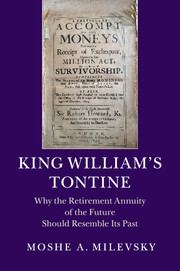Book contents
- Frontmatter
- Epigraph
- Contents
- Preface: In Memoriam for Jared
- Acknowledgments
- 1 King Billy, Protestant Hero of england
- 2 Tontine's Economic Origins: Cheaper Debt
- 3 A Most Curious Will(iam) and Older Than You Think
- 4 The Million Act to Fight a War against France
- 5 Don't Englishmen Die? Anti-Selection vs. Fraud
- 6 Is Your Tontine a Stock or a Bond?
- 7 Optimal Tontine: Hedging (Some) Longevity Risk
- 8 Conclusion: Tontines for the Twenty-First Century
- Epilogue: What Did William Really Know?
- Appendix A The List of Nominees
- Appendix B The Gompertz-Makeham Law of Mortality
- Appendix C 14% for One, 12% for Two, or 10% for Three?
- Source Notes and Guide to Further Reading
- References
- Index
3 - A Most Curious Will(iam) and Older Than You Think
Published online by Cambridge University Press: 05 May 2015
- Frontmatter
- Epigraph
- Contents
- Preface: In Memoriam for Jared
- Acknowledgments
- 1 King Billy, Protestant Hero of england
- 2 Tontine's Economic Origins: Cheaper Debt
- 3 A Most Curious Will(iam) and Older Than You Think
- 4 The Million Act to Fight a War against France
- 5 Don't Englishmen Die? Anti-Selection vs. Fraud
- 6 Is Your Tontine a Stock or a Bond?
- 7 Optimal Tontine: Hedging (Some) Longevity Risk
- 8 Conclusion: Tontines for the Twenty-First Century
- Epilogue: What Did William Really Know?
- Appendix A The List of Nominees
- Appendix B The Gompertz-Makeham Law of Mortality
- Appendix C 14% for One, 12% for Two, or 10% for Three?
- Source Notes and Guide to Further Reading
- References
- Index
Summary
LIFE AND DEATH IN ELIZABETHAN ENGLAND
In the year 1581, in the county of Lancashire in the northwest part of England, a wealthy landowner by the name of Alexander Houghton died without legitimate heirs to inherit his wealth and continue his title. Alexander Houghton was a nobleman with a large estate, a household with more than thirty servants, and substantial income from his properties and investments. Alexander loved the arts, theater, and music and supported a troupe of players from a local acting company in Lea Hall, Lancashire.
Although Alexander's half brother and brother-in-law inherited a part of the estate, he left provisions in his will that the younger servants and employees be given permanent employment with his relatives and that they be granted permanent financial support. All in all, Alexander left a substantial fraction of the estate to his devoted servants and employees. As anyone who has watched and enjoyed the PBS television show Downton Abbey can attest, the relationship between master and servant was quite close in England, having been developed over many years and generations.
However – and this is where things get interesting – Alexander Houghton didn't quite hand over a lump sum of money to his favored group of servants. Rather, he set up a long-term arrangement, which was equivalent to a strange sort of retirement pension.
First, the will specified that the annual rents from properties contained in the estate, amounting to about 330 shillings per year, be distributed among eleven of his most favored employees. It appears that the oldest was to receive 66 shillings per year, the next oldest 40 shillings per year, and so on, all the way to the youngest, who was to receive 13 shillings per year for life. These sums might seem trivial by today's standards, but in the mid-sixteenth century the average industrial wage was 125 shillings a year.
- Type
- Chapter
- Information
- King William's TontineWhy the Retirement Annuity of the Future Should Resemble its Past, pp. 37 - 49Publisher: Cambridge University PressPrint publication year: 2015



